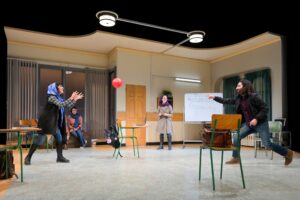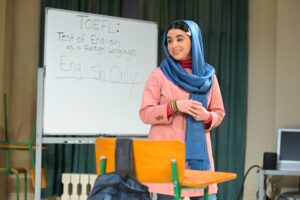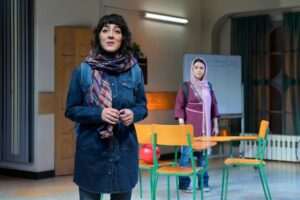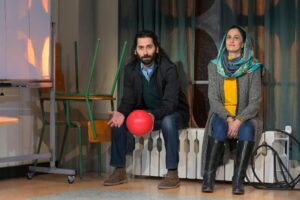English
Sanaz Toossi
Berkeley Repertory Theatre

As an adult who is attempting to learn another language later in life, I know firsthand how the experience can be both exciting and tormenting, with my altering within minutes between feeling proud of all I know and stupid for all that I still do not. But like most Americans born here, I am not learning another language to escape where I live, to reunite with my family, or to enter the school/profession of my choice. In the 2022 premiering play, English, Sanaz Toossi takes us into a storefront classroom in Iran, 2008, where those are the kinds of stakes facings four students of varying ages who are diligently trying to learn English in order to pass the stringent Test of English as a Foreign Language (or TOEFL). Their struggles and victories with accents, idioms, grammar, and of course vocabulary become rich fodder for both our comic enjoyment as well as our heartfelt empathy in a well-acted, West Coast premiere production at Berkeley Repertory Theatre where we see that what is also at stake for these language-learning students is their very identity as Iranians.
Marjan is a native Iranian who recently returned to her homeland after spending nine years in England. She is now teaching this advanced English class, writing the first day of class in capital letters on the white board, “ENGLISH ONLY.” She even keeps a tally on the board for each time a student switches to Farsi, with the threat of five slip-ups meaning the student must leave class for that day. In this classroom, she tells the students, “We are not Iranian … We are not even on this continent … Keep it [your Iranian-ness] outside this classroom.”

For eighteen-year-old Goli, that is not an issue. As Goli, Christine Mirzayan practically bubbles over in her exuberance for learning this new language – something she is doing mostly for the joy of it. For her, “English is like rice … English stays on top of the water.” Unabashed by her heavy accent, she recites with sparkling glee and bold manner “Mary Had a Little Lamb,” while adding with some sense of cultural superiority, “In Iran, we do not take animals to school.” Goli represents the wonder of learning a new language when little else is at stake; and she provides us, her fellow students, and herself opportunities to laugh without ridicule at her natural foibles along the way.

While Goli does not seem bothered by her accented English, for twenty-something Elham, “My accent is a war crime.” Mehry Eslaminia’s Elham is highly competitive, is often frustrated, and is not easily amused by nor much forgiving of her or others’ language mistakes. The tenseness that is seen in her clutched fists, downturned head, or eyes that can shoot arrows finds words when she says, “Every day in here, I feel like an idiot.” But idiot she is not, having scored perfect on her MCATs, with all that is standing between her and med school in Australia is an TOEFL score of 94 – something that has not happened in five previous attempts.

The older, stoically dignified, and generally restrained Roya is learning English as a pre-condition that her son now in Canada has set for her to move there. She constantly leaves him voice mails to show her progress, proudly reciting on calls never answered proof of her learning like the names of colors or all the numbers she now knows: “43, 548, and 7.” But in her Roya, there is a silent seething building in Sarah Nina Hayon’s stunning betrayal, one that begins to find voice full of proud defiance – a voice not in English but in her native Farsi. She faces Marjan head on to declare, “You talk about Farsi like it is a stench after a long day’s work.” Her Roya challenges us to consider what is lost in oneself when learning another language – especially when doing so under some duress.

Quite different from the other three students is the one young man in the class, Omid, who speaks English with almost no audible accents. He surprises everyone with his wide range of vocabulary, winning one English-practice game of naming items of clothes by coming up with “windbreaker” – a word even Marjan does not know. Omid claims he needs the class and TOEFL to get his green card since his goal is to go to the U.S.; but Amir Malaklou brings to his portrayal of Omid an air of language mastery and personal mystery that makes him ever-more intriguing to Marjan and a target for derision from Elham.
As Marjan, Sahar Bibiyan is outwardly confident and unafraid to be demanding of her students while still offering encouragement and occasional praise. However, her Marjan is also unwilling to accept another student’s sense of defeat or defiance. She steadfastly holds that “English is not your enemy … It’s not to be conquered.” However, something is happening to Marjan as she interacts and becomes closer with Omid. When she slips with a “w” coming out as a “v” and she compares her slightly flawed English to his seemingly perfect, she confesses, “These two languages are in my head, and I think Farsi is winning … I feel like I am disappearing.”
Most remarkable among the performances of this entire cast is each person’s ability to switch from a personal version of often heavily accented, broken-grammar English to non-accented, grammatically flawless English – the latter alerting us that the person is now speaking in native Farsi. Often this switch occurs mid-sentence and may ping-pong back-and-forth with incredible differentiation and seemingly with total ease by the actor. Kudos go not only to each cast member but also to Ana Bayat as dialect coach.
Sanaz Toossi helps us consider what it is like to see a new language as the necessary key to unlock a door that otherwise would be unattainable while also raising the question at what cost does one pay to go through that door. What happens if that door begins or even does open while one still feels a strong, magnetic pull to one’s originating country and culture? What is it like to struggle in that in-between; and is there a chance of being stuck in a kind of no-person’s land?
Mina Morita directs the twenty-plus scenes of this class’s duration with a pace that at times quickly and easily flows and at other times loses some energy and focus in the transitions. The fault may be more in a script whose one-hour, forty-minute duration (no intermission) begins to feel fifteen or so minutes too long. There is some non-additive repetition of classroom, language-learning exercises and of an ongoing, in-between-class rendezvous. The play’s ending is also a bit problematic, with at least one false ending.
That said, there is much to admire in the overall insights and thought-provoking questions raised in Berkeley Rep’s well-performed English by Sanaz Toossi’s in terms of the role in our current world of a language that is increasingly universal to the point of perhaps becoming culturally imperialistic.
Rating: 4 E
English continues through May 7, 2023, in production by Berkeley Repertory Theatre in Peet’s Theatre, 2025 Addison, Berkeley, CA. Tickets are available at https://www.berkeleyrep.org or by calling the box office Tuesday – Sunday, noon – 7 p.m. (510-647-2949.
Please note: Masks are required of all patrons inside the theatre.
Photo Credits: Alessandro Mello

Leave a Reply